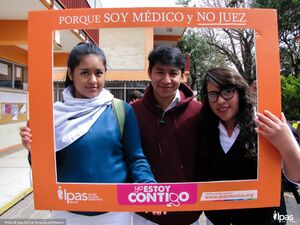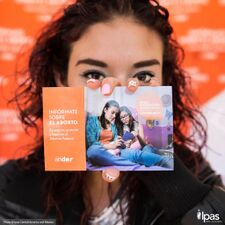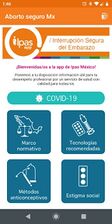Abortion Access in Latin Migration Routes: Difference between revisions
(Created page with "{{Project |Description=There are 57.5 million migrants in the Americas, and most of them are women and girls. During migration, they are frequently subjected to gender-based violence, which puts them at risk of unintended pregnancy and other health consequences. As a part of this project, we will increase access to abortion along key migration routes in Latin America and the Caribbean by disseminating a ChatBot that will provide information about SRHR and abortion access...") |
No edit summary |
||
| Line 17: | Line 17: | ||
# https://www.facebook.com/IpasCentroamericaMx/ | # https://www.facebook.com/IpasCentroamericaMx/ | ||
# https://twitter.com/Ipas_CAM | # https://twitter.com/Ipas_CAM | ||
=Project Gallery= | |||
|Problems=38030 | |Problems=38030 | ||
Revision as of 17:28, 23 May 2023
| Organization | Ipas |
|---|---|
| Region | Mexico |
| Website | Website |
| ProjectLeader | Daniela Perdomo |
| Linked Problems & Solutions
|
|---|
There are 57.5 million migrants in the Americas, and most of them are women and girls. During migration, they are frequently subjected to gender-based violence, which puts them at risk of unintended pregnancy and other health consequences. As a part of this project, we will increase access to abortion along key migration routes in Latin America and the Caribbean by disseminating a ChatBot that will provide information about SRHR and abortion access to migrant women and girls.
Challenge
Women and girls make up a majority of the 57.5 million migrants in the Americas. In Mexico, half of the migrants are women. High rates of gender-based violence in this population occur before and during migration, and barriers to accessing contraception put them at risk of unintended pregnancy and other health consequences. This population has limited access to sexual and reproductive health information and support.
Long-Term Impact
Our chatbot will help users overcome financial barriers to abortion by informing them that abortion in cases of GBV should be free of charge at Mexico's public health facilities. Our adapted chatbot would not only provide information on safe abortion self-management, but also ensure that migrants know which abortion accompaniment networks can link them to the support and material/financial resources needed to access care (ex. transportation).
References
- https://www.ipas.org
- https://ipascam.org/
- https://ipasmexico.org/
- https://www.facebook.com/IpasCentroamericaMx/
- https://twitter.com/Ipas_CAM
Project Gallery







